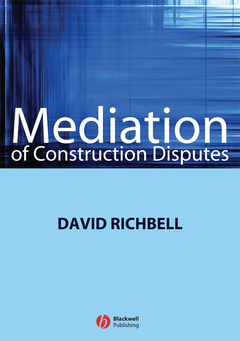Mediation of Construction Disputes
Auteur : Richbell David

Forward.
Introduction.
Chapter 1 The Construction industry is great at creating disputes.
Contractual.
The no contract scenario.
The ‘is there/is there not’ a contract scenario.
Incompatible contracts.
All-risk contracts.
Unrealistic performance criteria.
Financial.
A low-margin industry.
Claim cultures.
The squeeze game.
Culture.
Adversarial.
Fragmented.
High failure rate.
Complexity.
Incurable optimism.
External factors.
Weather-sensitive.
Consultants.
Government legislation.
Why people get into disputes.
Communication.
Personality.
Interpretation.
Chapter 1 in a nutshell.
Chapter 2 The Dispute Resolution options.
Consensual methods of resolving disputes.
Negotiation.
Conciliation.
Mediation.
Arb/Med and Adj/Med.
Court Settlement Procedure.
Resolving disputes through recommendation.
Neutral fact-finding.
Dispute Review Boards.
Early Neutral Evaluation.
Mediator recommendation.
Conciliation.
Imposed solutions to disputes.
Med/Arb and Med/Adj.
Adjudication.
Ombudsman.
Expert Determination.
Tribunals.
Arbitration.
Litigation.
Why traditional methods fail the parties.
Inherent injustice.
Cost and Time.
Adjudication is not the ‘Saviour’.
The better options for Dispute Resolution.
Consensual Processes.
Partnering.
Dispute Avoidance.
Chapter 2 in a nutshell.
Chapter 3 The case for the Mediation of Construction Disputes.
Better deals.
Speed and economy.
Flexibility in process and outcome.
Finality of outcome.
Mediator ‘added value’.
Getting off the treadmill.
Ongoing relationships.
Day in Court.
Commercial v Legal.
It adds another layer of cost.
It is too ‘touchy-feely’.
Mediation is non-binding and has no teeth.
Mediation is all about compromise.
Mediation is all talk, no commitment.
Chapter 3 in a nutshell.
Chapter 4 Preparing for Mediation.
Typical framework.
Stages of mediation.
Preparation by the Mediator.
Preparation by the Parties.
When to mediate.
How long should the mediation take?.
Who to choose as Mediator.
Mediator fees.
Co-Mediation.
Assistant Mediators.
Conflicts of interest.
Documents.
Where to mediate.
Who attends?.
Authority.
Who presents?.
Dry run?.
Pre-mediation meeting.
Pre-mediation contact.
The Mediation Agreement.
Risk analysis.
Anticipate the settlement.
Chapter 4 in a nutshell.
Chapter 5 Presenting at the Mediation.
Arrival.
Pre-Meeting.
Initial joint meeting.
Using the joint meeting.
Exploring stage.
Giving and receiving information.
Idle time.
Other’s shoes.
Non-financials.
Chapter 5 in a nutshell.
Chapter 6 Negotiating at the Mediation.
Negotiation zones.
Reviewing.
Bottom lines.
Negotiation strategy.
Incompatible styles.
First offers.
Offer logic.
Getting into deadlock.
Pain-pain.
Keeping options open.
Non-financials.
And finally.
Chapter 6 in a nutshell.
Chapter 7 Concluding the Mediation.
Finality.
Deals with dignity.
Part-deals.
No deal.
Writing the settlement agreement.
What can go wrong?.
Cooling off period.
Mediator recommendation.
Mediator liability.
Chapter 7 in a nutshell.
Chapter 8 Roles in Mediation (who does what?).
Client.
Legal advisor.
Counsel.
Experts.
Consultants.
Support staff.
Mediator.
Assistant.
Co-Mediator.
Chapter 8 in a nutshell.
Chapter 9 Avoiding disputes in the Construction Industry.
The positive side of conflict.
Creating a culture that is positive.
Twelve rules and challenges.
1. Establish clear, simple and constant lines of communication.
2. Establish clear roles, responsibilities, accountabilities and systems.
3. Practice (and therefore model) openness/transparency.
4. Build trust from the start; co-operate rather than confront.
5. acknowledge problems, don’t bury them.
6. Treat mistakes as learning points, not blame-makers.
7. Get the ‘headline’ agreed.
8. Listen, an show that you have heard.
9. Establish what parties need, rather than what they claim.
10. Involve a neutral early when disagreements are unresolved.
11. Re-evaluate agreements and headlines in the light of resolution.
12. Re-commit to the relationship/contract.
Partnering.
Chapter 9 in a nutshell.
Chapter 10 The Mediation Landscape.
Deal Mediation.
What is it?.
What does the Deal Mediator do?.
Difference between a Deal Mediator and Dispute Mediator.
Project Mediation.
Dispute Mediation.
Facilitation.
Preparing for the Facilitation.
Agenda.
Structure of the day.
Open space.
Role of Mediator as Facilitator.
Consensus-building.
Bespoke Mediation processes.
Construction Conciliation Group.
RICS Neighbour Dispute Service.
Tiered Resolution.
Chapter 10 in a nutshell.
Chapter 11 Conclusion – how to win at Mediation.
Prepare well.
Chose the right Mediator.
Get the best out of the opening joint session.
Co-operate.
Have a drink!.
And remember.
Appendix.
Summary of relevant law.
Risk Analysis checklist.
Decision tree.
Pre-mediation checklist.
Typical Mediation Agreement.
Typical Settlement Agreement.
Mediation Providers
Date de parution : 04-2008
Ouvrage de 192 p.
17.5x24.4 cm
Thème de Mediation of Construction Disputes :
Mots-clés :
book; users; mediation; party; expert; mediators; commercial; specialism; help; construction; confidence; mediation process; aim; great; creating disputes; industry; scenario; contract; contracts; high; government
